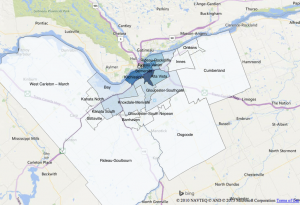
The only difference between predicting political moves and cold weather fronts is that you can see evidence for the former earlier in advance. In the aftermath of Justin Trudeau’s Liberals handily winning the federal election, a strong emphasis was put on preserving the environment. First, there was the appointing of Catherine McKenna as minister of climate change and the environment. Then came the first minsters’ meeting that revolved around climate change. Finally, there is the ongoing United Nations Climate Change Conference in Paris, in which Canada allegedly has been pushing for incredibly high emission reduction goals.
In Ottawa, the pressure for a revamped policy on the environment has been evident. The aforementioned McKenna is the Member of Parliament for Ottawa Centre, while thousands of Ottawans participated in a climate march that coincided with the Paris conference. It’s no secret that there is a push for Ottawa to become a ‘greener’ city. Vancouver, lauded in Canada for the way it has reduced greenhouse gas emissions and revamped transit, is an obvious example.
One of the hallmarks of Vancouver’s status as a green city has been the proliferation of its bike lanes, and it’s easy to see how similar infrastructure could be foisted on Ottawa. That claim could even be supported by data, as, in the 2011 National Household Survey, only 2045 fewer people said that they used the bicycle as their primary mode of transport in Ottawa as their Vancouver counterparts.
Report-North-America-Environment (PDF)
This would be misleading, however, as only four municipal wards in Ottawa had more than a thousand people list cycling as their main way of transportation, and all four are in or near downtown Ottawa. “Ottawa is a big cycling town, and the Canal is a great route. But as soon as you start to hit the outskirts of the town, you don’t find anyone biking,” said Cody MacKay, a resident of Heron Gate, part of the Alta Vista ward, which had 745 people report as full-time cyclists. MacKay drives the commute everyday to Carleton University where he’s a student.
Even those who live in the Somerset or Capital wards have an obstacle facing them if they choose to cycle: the weather. While the weather in Vancouver barely gets into negative degrees even in the winter, the same can’t be said for Ottawa and many bikes are put into storage come October. “It’s an amazing place to cycle, but it’s so hard to do when winter hits, because there’s all this extra gear you need,” says Elaine Feldman, a former federal servant living in Old Ottawa East. Feldman still bikes whenever she can but admits to putting away her green town bike at the first sight of snow or freezing rain.
Some would like to see the government pursue more lanes and advocate for more cycling, even in the winter. Feldman’s husband Andrew is an avid, everyday cycler, no matter the weather. It’s about a four-kilometre trip from their house to the Lester B. Pearson building where he works as a senior policy advisor for the Department of Global Affairs. He pushes the notion that you’re only as good as the clothes you wear: “I always say there’s no such thing as bad weather, just under-dressed people. So yeah, when it’s really cold, I go out in my balaclava.” He can’t resist a shot at the outgoing Conservative government. “Some might call it a ‘barbaric cultural practice.’”

